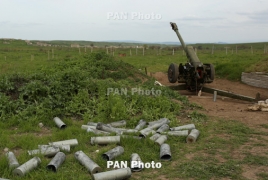Military lessons of Nagorno-Karabakh conflict – Michael Kofman December 15, 2020 - 16:31 AMT PanARMENIAN.Net - Political analyst Michael Kofman, who serves as Director of the Russia Studies Program at the CNA Corporation, has unveiled a fresh article about the military lessons of the Nagorno-Karabakh conflict and why the Armenian side "marched toward a military disaster" in the recent war. While many agree that Azerbaijan’s successful use of drones proved a tactical sensation, Kofman says it broadly confirmed long-standing lessons on the devastating effect airpower can have on a large ground force with relatively poor air defenses. According to him, such technology is diffusing much more rapidly than customized counters, or air defense systems designed to deal with it. The latter will eventually catch up, but in the interim, drones, especially loitering munitions drones, present a significant challenge for modern air defenses and ground forces, the expert says: the Nagorno-Karabakh conflict helped settle the question on whether legacy air defenses, such as the dated Soviet systems employed by Armenia, could be suitable or adapted to dealing with contemporary drones. The answer is decidedly negative, he says. "The Nagorno-Karabakh conflict reiterated that individual air defense systems do not aggregate into a layered or integrated air defense, which requires short, medium and operational range systems working with a common picture and with sufficient density. Armenia’s armor, artillery and infantry fighting vehicles were picked apart over the course of several weeks, while its limited air defense capacity suffered a similar fate. A smaller ground force, which is well-protected from air attacks, will prove a wiser investment than a large fleet of armor and artillery that lacks effective defense from the air. This is hardly a revelation. These trends in warfare were established decades ago, but it is now the case when facing even smaller powers with unmanned aviation," Kofman wrote in the piece published by Russia Matters. "Could Armenia have fought differently and won this conflict? The short answer is probably not, although it most certainly could have fared better. Armenia was disadvantaged from the outset given the quantitative and qualitative superiority on the Azerbaijani side, together with considerable Turkish support for Baku. Armenia’s political leadership appeared to be delusional about the military balance and the potential course of a war, while insufficiently investing in the right capabilities, force structure and prepared defenses. The problems were structural. For example, rather than buy more advanced air defense or electronic warfare systems, they invested in old and used OSA-AK air defense systems from Jordan. Azerbaijan had used drones and loitering munitions against Armenia in the four-day war of 2016, yet over the four years separating these respective conflicts, the Armenian military failed to adapt in almost every respect." The traumatic postmortem will continue to unfold in Yerevan as recriminations abound regarding the course of the conflict, he says: "Armenia’s policies and rhetoric in the run up to the conflict appeared out of touch with the reality of a country outmatched in every single respect. Yes, it had a sizable military, but Armenia’s investments simply did not match political strategy. They were not prepared for this war and steadily marched toward a military disaster." Six total incidents have burned 19 old-growth trees. Friday night 8 trees were torched along the beautiful main entrance. The EU does not intend to conduct military exercises with Armenia, Lead Spokesperson for EU Foreign Affairs and Security Policy Peter Stano says. Hikmet Hajiyev has said that there is no place for USAID operation in Azerbaijan any longer. A telephone conversation between Putin and Pashinyan before the CSTO summit is not planned, Peskov says. Partner news |